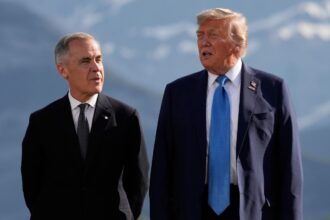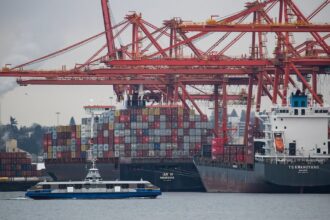The chill in Canadian boardrooms is palpable. As trade tensions with the United States continue to simmer, Canadian business leaders are increasingly hitting the pause button on major investment decisions, creating a concerning ripple effect across the economy that extends from Bay Street to the sports industry.
A comprehensive new survey conducted by ABX, QSR, and MGA reveals that 68% of Canadian C-suite executives have delayed or scaled back planned investments in the last quarter, citing unpredictable trade relations with Canada’s largest trading partner. This represents a 14% increase from similar polling conducted just six months ago.
“We’re in a high-stakes waiting game,” explains Morgan Davidson, CEO of Vancouver-based sportswear manufacturer Athletic North. “With potential tariffs looming over apparel and sporting goods, committing to our planned $12 million factory expansion feels like rolling dice in the dark.”
The survey highlights particular concern in sectors traditionally considered economic barometers. Manufacturing confidence has dropped 22% year-over-year, while technology investment intentions have fallen to their lowest levels since 2016.
For sports franchises and associated businesses, the hesitation is equally pronounced. The Toronto Raptors organization, which had been exploring a $75 million training facility upgrade, has now postponed the project indefinitely. “When currency fluctuations and cross-border costs become this unpredictable, even organizations with strong balance sheets need to reassess capital projects,” notes sports economist Dr. Leila Harrington.
The slowdown extends beyond major corporations. Among the 500 business leaders surveyed, 41% representing small and medium enterprises indicated they’ve reduced hiring plans for the coming year. This marks a troubling trend for a segment that accounts for approximately 70% of private sector employment.
Perhaps most concerning for Canadian economic prospects, 57% of respondents indicated they’re actively exploring shifting portions of their operations to the U.S. market – not just to avoid potential tariffs, but to mitigate broader uncertainty.
“This isn’t just about playing defense,” explains Ravi Patel, Chief Strategy Officer at Vancouver-based sports analytics firm GameMetrics. “For companies like ours that serve North American clients, having operations on both sides of the border becomes a strategic necessity in this environment.”
The Bank of Canada has taken note. In its latest monetary policy statement, it specifically cited business investment hesitancy as a factor in its economic projections, which were revised downward by 0.3% for the coming year.
What’s particularly troubling for economists is that this investment pause comes when many Canadian firms were reporting strong balance sheets and favorable borrowing conditions. The perfect scenario for expansion has been stalled by geopolitical friction.
“When I speak with fellow executives, nobody’s talking about growth right now – they’re discussing risk mitigation and contingency planning,” notes Jacqueline Renaud, CEO of Montreal-based athletic retailer SportsPlus. “That fundamental shift in conversation has real economic costs.”
For Canadian sports organizations and related businesses hoping to compete globally, this hesitation creates a concerning competitive disadvantage. While U.S. competitors continue aggressive technological and infrastructure investments, Canadian counterparts find themselves constrained by broader economic uncertainties.
Will this investment freeze thaw in coming months? Economists remain divided. The most optimistic scenario involves a clear resolution to trade tensions following upcoming bilateral talks. The pessimistic view suggests a prolonged period of uncertainty that could further erode Canadian business confidence.
What remains clear is that the current investment pause threatens to reshape Canada’s economic landscape in ways that extend far beyond the current news cycle. For both boardrooms and playing fields across the country, the game has fundamentally changed.
For more insights on this developing story, visit CO24 Business for continuing coverage.










